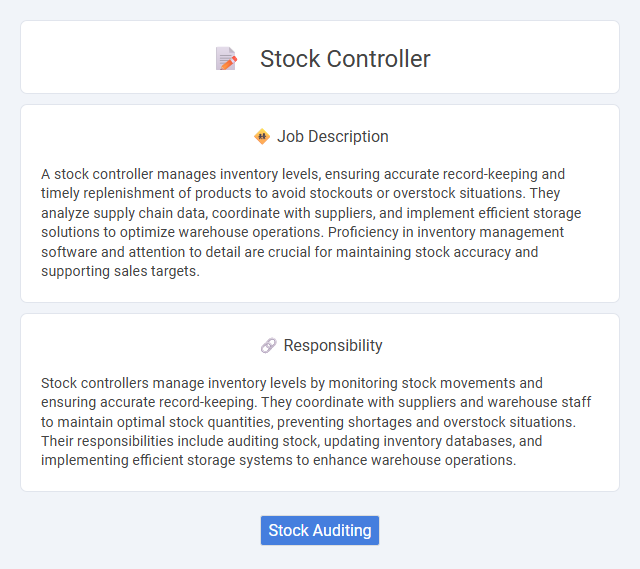
A stock controller manages inventory levels, ensuring accurate record-keeping and timely replenishment of products to avoid stockouts or overstock situations. They analyze supply chain data, coordinate with suppliers, and implement efficient storage solutions to optimize warehouse operations. Proficiency in inventory management software and attention to detail are crucial for maintaining stock accuracy and supporting sales targets.
Individuals who are detail-oriented and possess strong organizational skills are likely to be well-suited for a stock controller position. Those who thrive in environments requiring accuracy, inventory management, and routine tasks probably have a higher chance of performing effectively. People who may struggle with repetitive duties or high-pressure inventory reconciliation might find this role less suitable.
Qualification
A Stock Controller requires strong organizational skills and proficiency in inventory management software such as SAP or Oracle. Candidates typically hold a high school diploma or equivalent, with many employers preferring additional qualifications like a diploma in supply chain management or logistics. Experience in data analysis, stock auditing, and knowledge of warehouse operations enhances the ability to maintain accurate stock levels and reduce discrepancies.
Responsibility
Stock controllers manage inventory levels by monitoring stock movements and ensuring accurate record-keeping. They coordinate with suppliers and warehouse staff to maintain optimal stock quantities, preventing shortages and overstock situations. Their responsibilities include auditing stock, updating inventory databases, and implementing efficient storage systems to enhance warehouse operations.
Benefit
A stock controller is likely to benefit from enhanced organizational skills and increased attention to detail, which are crucial for maintaining inventory accuracy. This role probably offers opportunities for career advancement in supply chain management or logistics due to its operational significance. Employees may also experience improved problem-solving abilities as they frequently address stock discrepancies and optimize inventory processes.
Challenge
Stock controller roles may involve significant challenges related to maintaining accurate inventory levels amid fluctuating demand and supply chain disruptions. Managing discrepancies between physical stock and digital records could require meticulous attention to detail and problem-solving skills. The probability of encountering urgent restocking or auditing tasks might increase pressure while ensuring seamless operations.
Career Advancement
A stock controller plays a critical role in inventory management, ensuring accurate tracking and timely replenishment of products to optimize supply chain efficiency. Mastery of inventory software and analytical skills can lead to advanced positions such as inventory manager, logistics coordinator, or supply chain analyst. Continuous professional development and certifications in supply chain management significantly enhance career progression opportunities within retail and manufacturing sectors.
Key Terms
Stock Auditing
Stock controllers specializing in stock auditing ensure accurate inventory records by performing systematic physical counts and reconciling discrepancies with database entries. They utilize inventory management software and data analytics to identify potential errors, theft, or shrinkage, enhancing overall stock accuracy and operational efficiency. Expertise in compliance standards and detailed report generation supports strategic decision-making and optimizes supply chain management.
 kuljobs.com
kuljobs.com